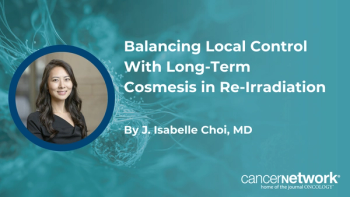
Andrew Cook, MD, on the Potential Role of Gabapentin in Head and Neck Cancer
CancerNetwork® sat down with Andrew Cook, MD, at the 2021 American Society for Radiation Oncology to discuss the potential role of gabapentin in head and neck cancer despite garnering negative results in oropharynx cancer.
At the
Transcript:
Negative findings are an important part of reporting findings in medicine. The role of gabapentin is still debated in its utilization for patients with head and neck cancer. The results from other studies have been mixed, [as to] whether it’s helpful or not. Our study was a little bit different than others. We used a very select group of patients with locally advanced oropharynx cancer [receiving] concurrent chemoradiotherapy. Given that we had negative findings regarding this patient population, we think that it’s unlikely that gabapentin is beneficial for this group of [patients. As] these negative results that can inform future studies, [we may how] resources should be directed in other ways.
Gabapentin may not be the most useful thing to study in the future, and there can be other strategies that can be looked at. I know right now in head and neck cancers, especially human papillomavirus–positive oropharynx cancer, treatment de-escalation or deintensification is a hot topic right now. That is something worthwhile that should be pursued; maybe different medications if people have ideas about that. It’s beneficial in terms of guiding future studies and future efforts from that standpoint. Also, again, it’s a very select group of patients, so I don’t think these results can be generalized to the entire head and neck cancer patient population. I think that gabapentin may still be beneficial for patients who’ve maybe undergone surgery and are getting radiation after or possibly different subsites. For this group, it seems to not [have worked].
Reference
Cook AE, Modh A, Ali H, et al. Randomized phase III, double-blind, placebo-controlled study of prophylactic gabapentin for the reduction of radiation therapy-induced pain during the treatment of oropharyngeal squamous cell carcinoma. Int J Radiat Oncol Biol Phys. 2021; 111 (suppl 3): S61-S62. doi/10.1016/j.ijrobp.2021.07.156
Newsletter
Stay up to date on recent advances in the multidisciplinary approach to cancer.












































